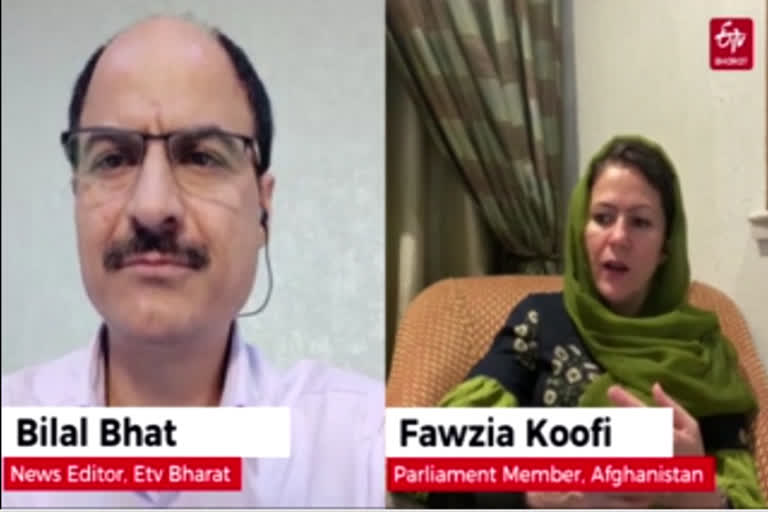Q: When you heard that you are going to share the table with the Taliban, who have never accepted you as equals in the political process in Afghanistan. What was your immediate response to this development?
I think being an Afghani woman I have been the victim of the Taliban government. We were deprived of basic rights, including the right to access education, health, social and political participation. We don’t want once again women to be the victim of war. Therefore, it’s important that women are on the negotiation table and by participating in these talks, basically, we break taboos because it is not only with the Taliban but historically also in Afghanistan, all of these peace talks have been carried out by men and that’s why I think it’s a history to set and I feel powerful but yes it comes with a lot of responsibility.
Q: How optimistic are you about the talks that they will actually bring equal rights for women which you have been discussing in the parliament and outside of the parliament, for the rights of women, rights to education for the girl child and development of women in the entire region?
First of all, we have to be clear that Afghanistan is not the country that is dominated by one particular view, whether it’s an extreme view, in terms of interpretation of Islam or liberal views. We have to take a moderate way of life and moderate definition of Islam. Therefore, we are fighting for Afghanistan, where we can live in peace with our neighbours. We want an Afghanistan that represents everyone equally regardless of their gender. Women education is the cornerstone for women of Afghanistan, and for men of Afghanistan also. No progress is guaranteed without having access to education.
We are in Doha, discussing rules and procedures and other technical issues because we have to put the foundation right. Once the foundation is put right for these rounds of talks then it becomes easier. Probably we shall not be able to discuss women rights at this stage because it’s one of the sensitive issues, as early as the beginning of talks, we hope over the time we put some major issues in place to avoid dominance of one point of view over the other. We want to create a space where everybody will able to live with peace and prosperity.
Q: At the beginning, Taliban made it clear to all political parties that they want Islamic law in Afghanistan. How other parties are responding to that and how do you want to see the country in a new scheme of things?
Well, Afghanistan is a Muslim country. Our constitution clearly says that no law in Afghanistan will be enforced if it contradicts Islam. The constitution also guarantees that minorities and other religious group have all the freedom to practice their faith. The issue is about the accommodation of diversity and inclusivity. Manipulation of one particular idea over the other does not work anywhere. We are fighting for an Afghanistan where everyone will have a chance to vote ’one person one vote’ regardless of gender, political belief and that is the Afghanistan we hope to achieve at the end of peace talks.
Q: You mentioned about the inclusivity, but there were reports about the persecution of non-Muslims in Afghanistan and some of the people who had to be rescued by India. Like some members of the Sikh community were being persecuted in Kabul, Jalalabad and elsewhere. How would you ensure religious minorities are equally allowed to practice their faith in Afghanistan.
Security of religious and sectarian minorities in the process of peace is a principle matter, it’s not a choice but a need for today’s Afghanistan.
I understand, there has been a problem and attacks against our religious minorities, persecution of religious minorities, but this is because of wars. We have to understand two things, first, we have to differentiate the level of tolerance and second social acceptance in Afghanistan. We are proud of our religious minorities and they have lived beside us through thick and thin of our history. There is willingness and acceptance; There is no discrimination in society. But, when it comes to an attack against them from a political group or a military extremist group, there have been recent attacks and they have been targeted and we are aware of that. We are sorry to see them fleeing from Afghanistan but preserving their rights is not a choice, as I said it’s a need. So, everyone should be clear on that principal matter for discussion. For us, it’s inclusive Afghanistan and there is no negotiation about that.
Q: India has heavily invested in Afghanistan's development programs. How do you see India’s position post deal with the Taliban?
I know that India has invested in many sectors including the education sector and people of Afghanistan are grateful of the Indian support to Afghanistan. We look at India as a strategic partner and playing an important role along with the other neighbouring countries in this process.
Q: What are your major demands and the demands of the Taliban?
Right now we are basically discussing the rules and procedures and the basic code of conducts.



